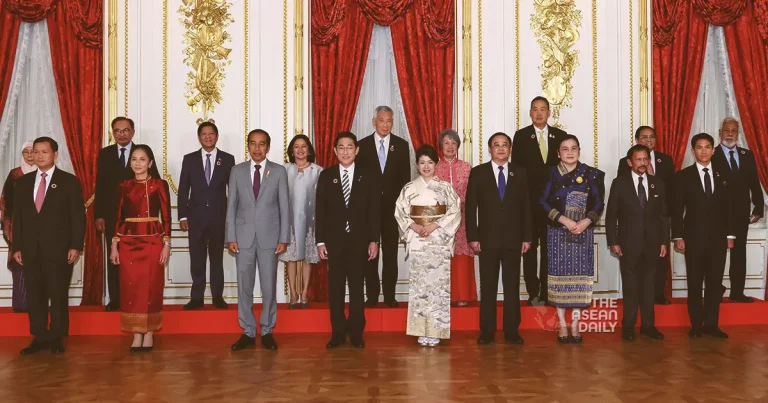17-12-2023 (TOKYO) Japan’s Prime Minister Fumio Kishida emphasized the significance of the Association of Southeast Asian Nations (ASEAN) as a crucial partner in overcoming global challenges and establishing a free and open Indo-Pacific. Speaking at a special summit commemorating the 50th anniversary of Japan-ASEAN relations, Kishida highlighted the enduring spirit of trust and partnership that has developed over the past five decades, serving as the foundation for future cooperation.
The summit, attended by Kishida and leaders from all Southeast Asian countries except Myanmar, resulted in the adoption of a joint vision statement and an extensive 18-page implementation plan consisting of 130 points. The plan encompasses various areas of collaboration, including security, economy, and people-to-people exchanges, with progress reports to be submitted annually during the ASEAN-Japan summit.
Indonesian President Joko Widodo, who currently holds the ASEAN chairmanship for 2023, emphasized the role of ASEAN and Japan as partners in promoting peace and stability. He highlighted the importance of inclusive collaboration and adherence to international law, with ASEAN centrality at the core of their cooperation.
The leaders also addressed the Gaza conflict during their discussions, with President Widodo stressing the need for a permanent ceasefire, humanitarian aid access, and the immediate initiation of the peace process.
To celebrate the summit, Tokyo Tower was illuminated in the colors of ASEAN—red, yellow, and blue—instead of its traditional orange hue on December 17. However, looming over the event was the strategic competition between the United States and China, placing pressure on ASEAN to maintain its position of not aligning with either side.
Dr. Kei Koga from Singapore’s Nanyang Technological University commented on the lack of significant breakthroughs, perceiving the new vision as a continuation of existing policies. He noted that ASEAN, as a consensus-based decision-making institution, has chosen a conservative approach to managing the relationship, while Japan prefers to see ASEAN play a more active and influential role in shaping regional rules and norms.
Dr. Mie Oba from Kanagawa University explained that achieving regional stability, a public good, has become increasingly challenging due to the escalating US-China confrontation and the relative decline of the US as a superpower.
Among the action plan discussed by the leaders is the enhancement of dialogue and cooperation to maintain maritime security, safety, and order based on the rule of law. This includes ensuring freedom and safety of navigation, unimpeded commerce, and the strengthening of maritime security and safety.
During the summit, Prime Minister Kishida expressed Japan’s commitment to contributing to regional peace and stability through the Official Security Assistance (OSA) framework launched in April. The OSA, serving as the military counterpart to Japan’s traditional official development assistance, involves providing defense equipment and grants to friendly armed forces in developing countries that share similar values.
A day before the summit, Malaysia became the second ASEAN country to receive Japan’s OSA after the Philippines. The 400 million yen (S$3.75 million) deal includes the provision of rescue boats and maritime surveillance drones. Both Malaysia and the Philippines have overlapping territorial claims with China in the South China Sea, an important trade corridor. Japan expressed strong concerns over recent “dangerous actions” in the region following a confrontation between Philippine and Chinese vessels, where Manila accused Beijing of firing water cannons and ramming its resupply vessels and coast guard ship.
The leaders of ASEAN and Japan also pledged to bolster economic security by enhancing the resilience of supply chains. Dr. Oba emphasized the need for ASEAN and Japan to cooperate as active promoters of the regional order, benefiting their respective strategic independence. She highlighted that these measures should not be perceived as targeting any specific country.
During the summit, the leaders expressed their hopes of passing down mutual trust and friendship to future generations. Prime Minister Kishida announced a pledge of 40 billion yen (S$375 million) for youth exchange programs, aiming to benefit over 10 million individuals in the next decade. Additionally, 15 billion yen will be allocated to joint research and human resources development.
The leaders also encouraged cross-border investment and innovation, particularly within the business and start-up sectors. Japan’s public and private sectors committed to investing more than US$35 billion (S$47 billion) in ASEAN over the next five years.
President Widodo concluded by stating that the partnership between ASEAN and Japan can contribute to maintaining stability, fostering closer relationships among their peoples, and driving economic growth in the region and globally.




